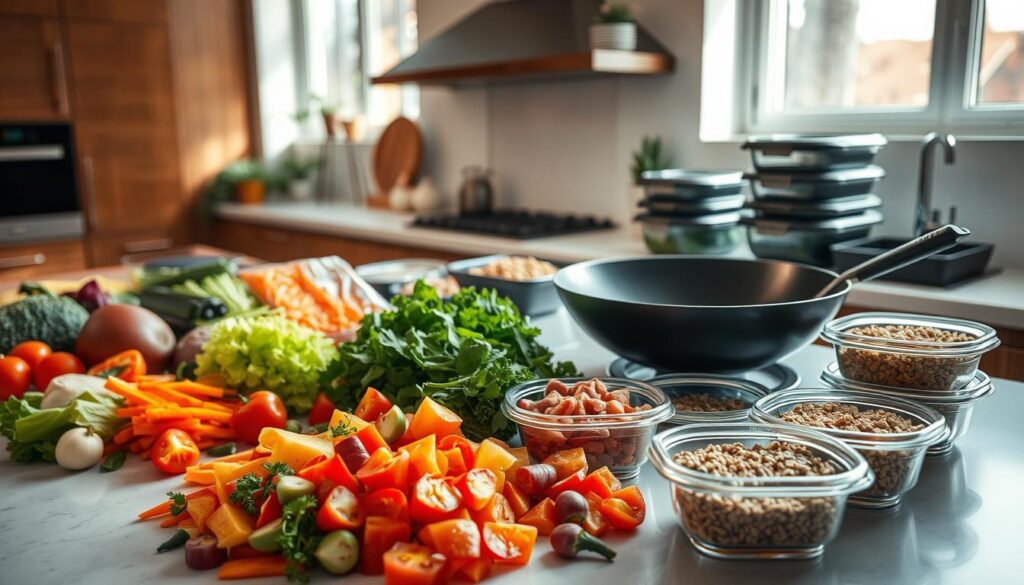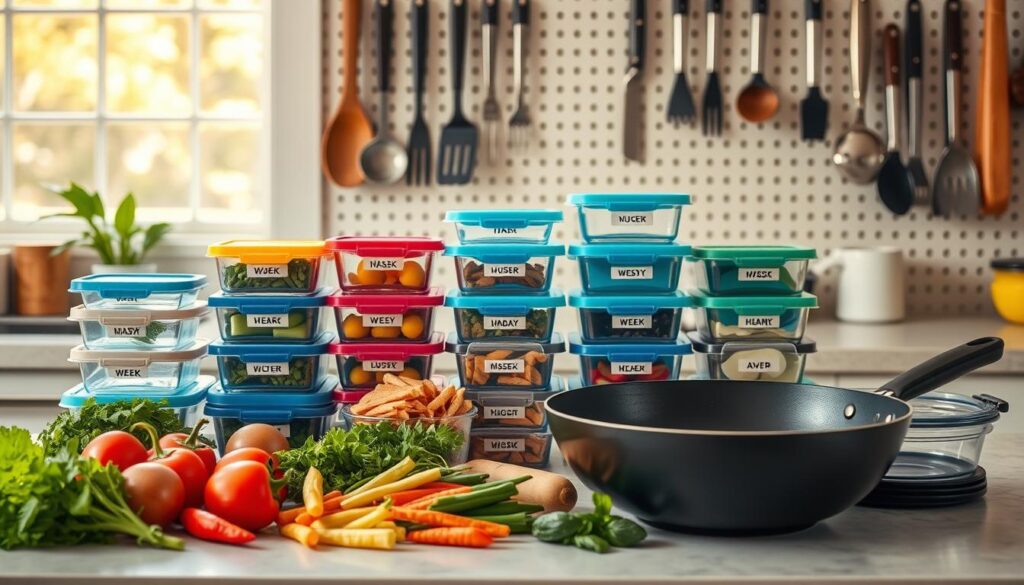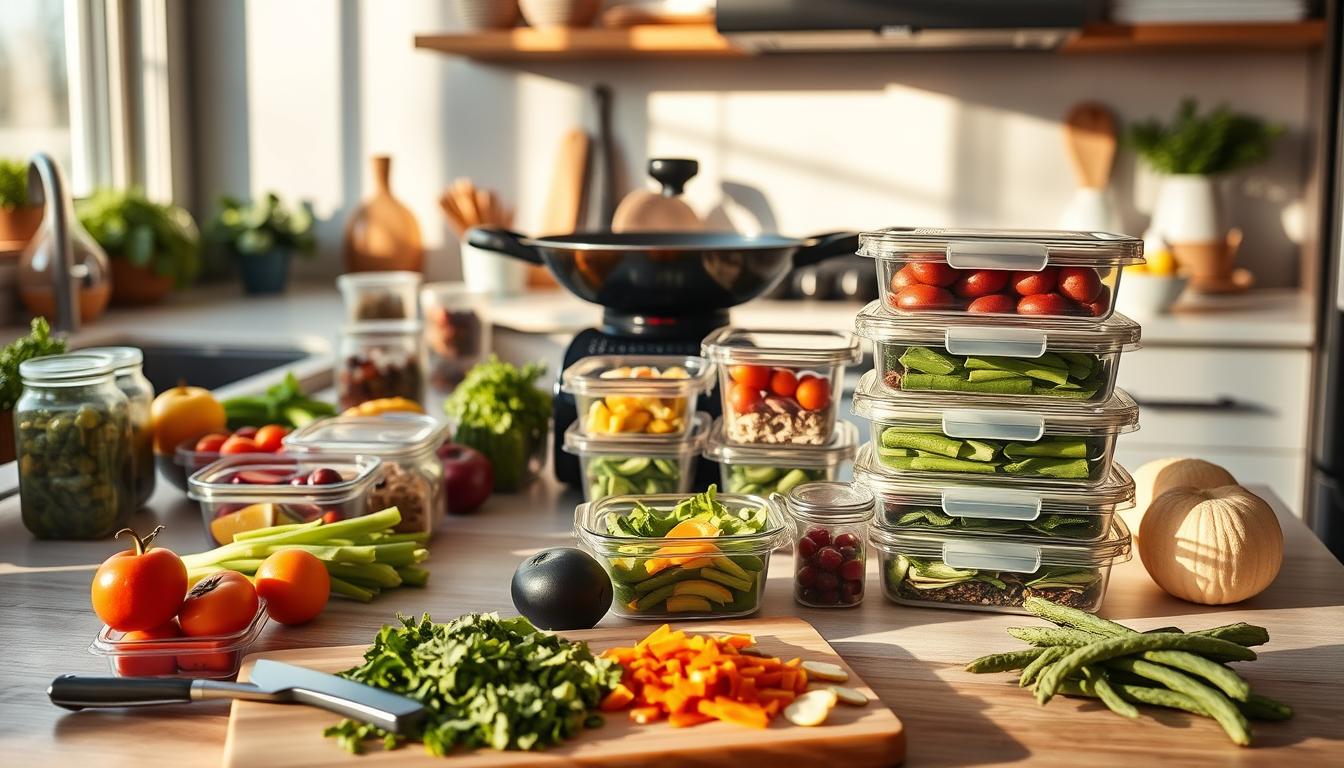Starting with meal prep can feel daunting, but with over 60 healthy ideas, it’s simpler than you think. You can make tasty, nutritious meals for breakfast, lunch, and dinner. Meal prep saves time, money, and cuts down on kitchen waste. For instance, hard-boiled eggs last up to 5 days in the fridge, making them a fantastic lunch option.
Meal prep means cooking 3-7 days’ worth of food at once. With beginner tips, you can whip up healthy lunches that are great for when you’re on the move. Begin with a simple recipe to get into the swing of meal prep. This way, you can enjoy a nutritious lunch, save time, and cut down on food waste.
Key Takeaways
- Meal prepping can save time, money, and reduce waste in the kitchen
- Starting with one simple recipe can help beginners ease into meal prepping
- Meal prep can lead to a 25% reduction in the temptation to eat unhealthy foods or dine out
- Using glass containers can provide heat retention and durability for meal prep
- Meal prepping can help maintain a healthy eating pattern throughout the week
- Preparing meals in advance can save more than two hours of cooking time weekly
Understanding the Basics of Meal Prep
Meal prep is a simple way to prepare healthy meals in advance. It saves time and money. By understanding meal prep basics, you can plan meals that fit your lifestyle.
Meal prep means preparing meals or ingredients ahead of time. This makes healthy eating easier on busy days. It reduces decision fatigue, saves time, and promotes a balanced diet.
What Is Meal Prep?
Meal prep is preparing meals or ingredients in advance. This makes healthy eating easier and more convenient. It includes cooking meals in bulk and storing them for later.
Benefits of Meal Prepping
Meal prep has many benefits. It reduces decision fatigue and saves time. It also promotes a balanced diet and increases vegetable consumption.
- Reducing decision fatigue by minimizing daily food-related choices
- Saving time by cooking meals in bulk and portioning out individual servings
- Promoting a balanced diet by planning and preparing healthy meals in advance
- Increasing vegetable consumption and reducing fast food consumption
Tools You Need to Get Started
To start meal prep, you need some basic tools. These include:
- Microwave-safe containers for storing and reheating meals
- A refrigerator and freezer for storing meals and ingredients
- A cooking utensils and equipment, such as a slow cooker or instant pot
| Meal Prep Tool | Description |
|---|---|
| Microwave-safe containers | For storing and reheating meals |
| Refrigerator and freezer | For storing meals and ingredients |
| Cooking utensils and equipment | For preparing and cooking meals |
Planning Your Weekly Menu
Planning a weekly menu is key for meal prep beginners. It means picking balanced meals and adding variety to your diet. You can also use sample meal idea templates. This way, you eat healthy, save time, and money.
For example, easy lunches could be grilled chicken with roasted veggies or a whole-grain pita with lean turkey and avocado. A good menu helps you avoid fast food, which is often unhealthy.
Dietary guidelines suggest half your plate should be fruits and veggies. The other half should be protein and grains. This makes meals tasty and nutritious. Here are some balanced meal ideas:
- Grilled chicken with quinoa and steamed broccoli
- Baked salmon with sweet potato and green beans
- Lentil soup with whole-grain bread and a side salad
Adding variety to your diet is important. It means trying new ingredients and cooking methods. With a bit of planning and creativity, meal prep becomes easy and fun.
Shopping Smart for Meal Prep
Shopping smart is key for meal prep. It ensures you get the right ingredients for your meals. Making a grocery list is a must. It keeps you organized and focused on what you need.
Planning your meals helps you make a detailed grocery list. This can cut down your shopping time by about 25%. A good list also helps you avoid buying things you don’t need and stay within your budget.
When picking out ingredients, think about their nutritional value and how versatile they are. Leafy greens like spinach and kale are full of nutrients. They’re great in salads and smoothies.

For budget-friendly shopping, consider buying in bulk. This can save you up to 20% on items like rice, beans, and nuts. Also, plan meals around seasonal produce. This can save money and ensure you get the freshest ingredients.
By shopping smart and planning meals, you save time and money. You’ll enjoy healthy, tasty meals, including a great lunch, thanks to effective meal prep.
Cooking Efficiently for Meal Prep
Cooking efficiently for meal prep saves time and energy. It ensures you eat healthy and nutritious food. By using time-saving meals and healthy prep techniques, you can cut down cooking time by 20-30 hours. One-pot and sheet pan recipes are great because they clean up easily and can be made ahead.
Batch cooking is key for healthy meal prep. It lets you make big batches of food to portion and reheat later. Techniques like slow cooking, roasting, and sautéing are popular. Also, gadgets like instant pots and air fryers cut down cooking time, making prep easier.
Benefits of efficient cooking for meal prep include:
- Less weekly cooking time
- Less food waste
- More meal variety
- Better nutrition
Using these efficient cooking methods and gadgets helps make healthy meals quickly. This approach saves time and energy. It also reduces stress and makes eating healthy more fun.
| Meal Prep Technique | Time Savings | Nutritional Benefits |
|---|---|---|
| One-pot recipes | 30% reduction in cleanup time | More veggies |
| Batch cooking | 20-30 hours less cooking time | More protein |
| Time-saving kitchen gadgets | 50% less cooking time | More healthy fats |
Storing Your Meals Safely
Keeping your meals safe is key in meal prep. It helps keep food fresh longer and cuts down on waste. Choose containers that are airtight and leak-proof for your healthy lunches.
Research shows that right food storage can cut down on waste. Storing meals in the fridge below 40°F (4°C) stops bacteria from growing. Here are some tips for safe food storage:
- Use airtight and leak-proof containers to store meals.
- Label your meals with the date and contents.
- Store meals in the fridge at a temperature below 40°F (4°C).
- Freeze meals at 0°F (-18°C) to prevent bacterial growth.
By following these tips, your meals stay safe and healthy. Always check your fridge and freezer temperatures. This way, you can enjoy your meal prep while keeping food safe and reducing waste.
Choosing the right containers is vital for meal prep. Look for containers made for meal prep, like glass or plastic ones with lids. They keep your meals fresh and prevent spills, perfect for healthy lunches.
| Container Type | Benefits |
|---|---|
| Glass Containers | Airtight, leak-proof, and non-toxic |
| Plastic Containers | Lightweight, affordable, and easy to clean |
Staying Organized with Meal Prep
Staying organized is key for successful meal prep, focusing on easy lunch ideas and weekly meal planning. A schedule and meal tracking help you eat healthy and save time. This reduces stress too.
For meal prep for beginners, start simple and add complexity as you get better. Plan meals, make a grocery list, and prep ingredients ahead of time.
Here are some tips for staying organized with meal prep:
- Make a calendar to plan meals for the week.
- Use a meal prep app to track meals and ingredients.
- Prep ingredients in advance to save time during the week.
Follow these tips to make meal prep easy. Enjoy healthy, tasty meals all week. 
| Meal Prep Tip | Description |
|---|---|
| Plan your meals | Create a calendar to plan your meals for the week |
| Prep ingredients | Prep ingredients in advance to save time during the week |
| Use a meal prep app | Use a meal prep app to keep track of your meals and ingredients |
Tips for Healthy Meal Prep
Healthy meal prep is all about using whole foods and smart swaps. It’s about cutting down on added sugars and sodium. This way, you get tasty, nutritious meals without spending too much time in the kitchen.
Start by adding more fruits, veggies, whole grains, and lean proteins to your meals. Plan ahead and make a shopping list to get everything you need. Also, try to use less sugar and salt by choosing herbs and spices for flavor.
Smart ingredient swaps can make a big difference. Swap white rice for brown, or choose whole wheat over white bread. These changes boost your meal’s nutrition and make healthy meal prep a habit. You’ll enjoy quick, healthy meals while keeping your diet balanced.
Avoiding Common Meal Prep Mistakes
Meal prep can get complicated, leading to burnout. It’s better to keep things simple with whole, nutritious foods. This way, you’re more likely to stick with your healthy lunch plans.
Overcomplicating Your Meals
Complicated meals can be frustrating. Stick to simple, healthy recipes that you can prep ahead. This saves time and makes meal prep fun. Try making a big batch of brown rice or quinoa on the weekend for different meals later.
Ignoring Portion Control
Ignoring portion sizes can mess up your meal prep. Use a food scale or measuring cups to keep track. This helps you eat the right amount and stay on track. Also, use meal prep containers with portion control in mind.
Not Listening to Your Body’s Needs
Not listening to your body can lead to burnout. Pay attention to when you’re hungry or full. Adjust your meal prep plan to meet your needs. For example, add a healthy snack if you’re always hungry in the afternoon.
- Plan your meals in advance to avoid last-minute takeout or fast food
- Use a meal prep container with portion control in mind
- Listen to your body’s hunger and fullness cues to adjust your meal prep plan
Staying Motivated on Your Meal Prep Journey
Starting your meal prep journey is exciting. But, staying motivated is key to success. Setting goals, joining communities, and celebrating wins can keep you going.
Setting Realistic Goals
Begin with goals that fit your life and diet. Maybe it’s making a few easy lunches each week or adding more whole foods. Break big goals into smaller steps. Celebrate each small win to stay motivated.
Joining Meal Prep Communities
Connecting with meal prep fans can change your game. Look for online forums, social media groups, or local meet-ups. Share recipes, solve problems, and get inspired. Learning from others keeps you on track.
Celebrating Your Successes
Remember to celebrate your hard work. Treat yourself to a new gadget or share a meal with family. Acknowledging your efforts boosts your motivation to keep going.

